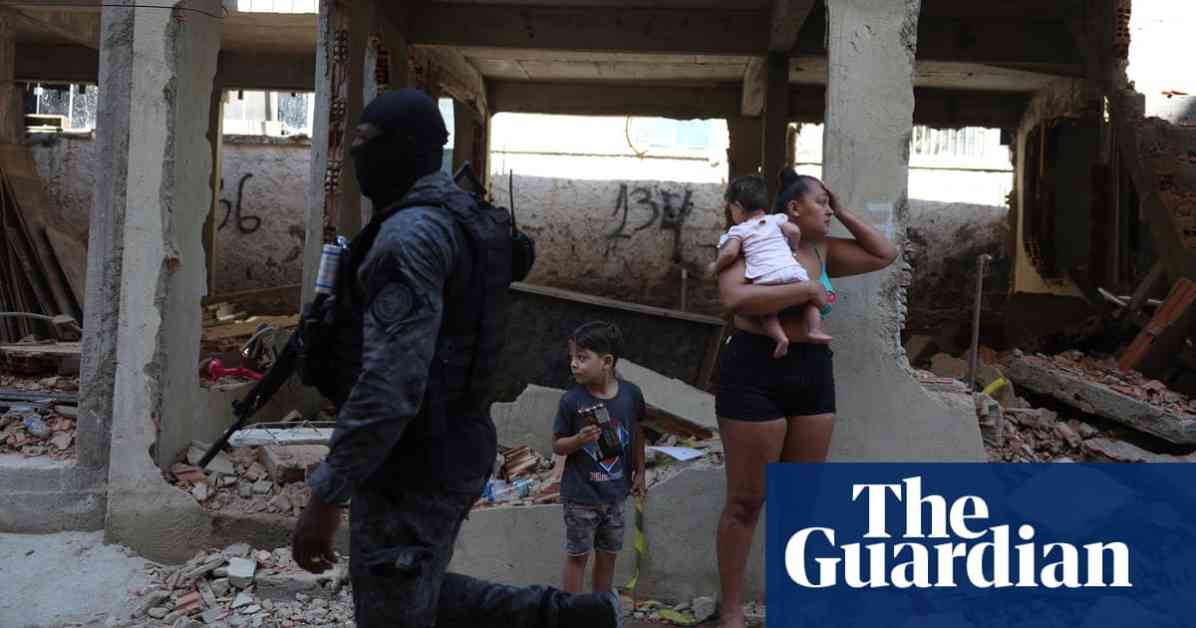Rio’s Children Suffer as Police Crack Down on Gangs: Impact of Stray Bullets and Closed Schools
In the bustling streets of Rio de Janeiro’s largest favelas, the sound of gunshots has become a familiar backdrop to daily life. For science teacher Roberto Brandão, 54, this harsh reality is a constant threat that he must prepare for each day as he heads to work in a school in Maré, one of the city’s most densely populated favelas. Alongside textbooks and marker pens, Brandão carries a first-aid kit in his backpack, ready to treat any student or himself if they are hit by a stray bullet.
The ongoing police operations in Maré have had a profound impact on the community, with buildings being demolished and schools forced to close for safety reasons. Brandão, like many other teachers and residents in Maré, is all too familiar with the disruptions caused by these operations. “It’s inconceivable to imagine 30 days of police operations in wealthy neighborhoods like Leblon or Copacabana, so why is it acceptable in Maré?” questions Eblin Farage, a social work professor at the Federal Fluminense University.
The closure of schools in Maré has resulted in the loss of over 29 days of classes this year alone, leaving many students without access to education and vital resources. A recent study conducted by the NGO Redes da Maré found that when schools close due to police operations, two-thirds of students feel that the missed content is never covered again. This disruption not only affects their education but also their concentration and overall well-being.
For many children in Maré, the school provides more than just education—it also serves as a source of food and stability in their lives. Alessandra Pinheiro, education coordinator at Redes da Maré, emphasizes the importance of ensuring that these children have access to a safe and consistent learning environment. “It’s about the right to have a future,” she says, highlighting the long-term impact of these disruptions on the children’s development.
The recent book “Eu devia estar na escola” (I should be at school) features drawings created by children from Maré, expressing their frustrations and fears about missing classes due to the ongoing violence in their community. One drawing poignantly asks, “How are we supposed to achieve our dreams when we miss so many classes?” This sentiment resonates with parents like Maria dos Prazeres, who struggle to keep their children engaged and occupied during the extended school closures.
The toll of these disruptions extends beyond the educational realm, affecting families’ livelihoods and sense of security. Prazeres, who lost her job due to the need to care for her young son during the school closures, reflects on the challenges faced by many parents in Maré. “I liked having my own money, but I’m afraid to return to work. What if there’s another operation tomorrow?” she wonders, highlighting the pervasive fear and uncertainty that looms over the community.
As the community grapples with the impact of the ongoing police operations, there is a growing call for alternative approaches to ensuring public safety in Maré. Farage emphasizes the need for sustainable solutions that prioritize the well-being of residents and address the root causes of violence in the favelas. “The state cannot be a violator of rights,” she asserts, advocating for a more holistic and community-centered approach to public security.
Despite the challenges and disruptions faced by residents of Maré, there is a resilient spirit that continues to shine through in the face of adversity. Science teacher Brandão, who has witnessed the toll of violence on his students firsthand, remains committed to advocating for their rights and ensuring they have access to quality education. “I’m tired of losing former students this way,” he laments, highlighting the urgency of addressing the systemic issues that perpetuate violence in the favelas.
As Rio’s city hall faces scrutiny over the demolitions and school closures in Maré, there is a renewed sense of urgency to address the underlying issues that perpetuate violence and insecurity in the community. With students now facing the challenge of making up for lost class time, the need for comprehensive solutions that prioritize the well-being and future of Maré’s children has never been more evident.
In the midst of this turmoil, the voices of Maré’s residents and advocates continue to ring out, calling for justice, dignity, and a brighter future for the community. As the city grapples with the complex realities of violence and poverty in its favelas, the resilience and determination of those like Roberto Brandão and Maria dos Prazeres serve as a testament to the strength and spirit of Maré’s children and families. It is a reminder that in the face of adversity, hope and solidarity can prevail, paving the way for a brighter tomorrow for all of Rio’s residents.

